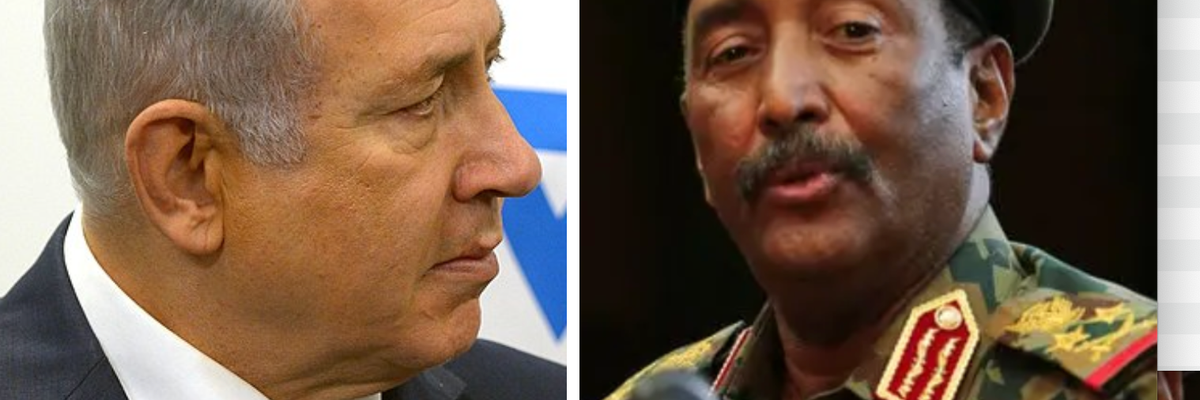Israel is a behind-the-scenes powerbroker in Sudan.
It’s long been clear that the road to peace in Sudan runs through Egypt, Saudi Arabia and the United Arab Emirates — America’s three closest Arab allies. But last month, Israeli Prime Minister Benjamin Netanyahu reminded Sudanese that he has a stake in their country too.
Speaking at the UN General Assembly in September, Netanyahu caused a stir among Sudanese when he held up two maps, ‘The Curse’ and ‘The Blessing.’ The first had Israel’s sworn enemies — Iran, Iraq, Lebanon, Syria and the Houthis in Yemen—marked in black. The second had its friends in green — among them Egypt, Saudi Arabia, the UAE and Sudan.
Shortly after that, Israeli journalist Jonathan Lis wrote that Israel was floating a possible deal to end the fighting in Gaza, in which senior Hamas leaders would go into exile in Sudan. Hamas denied it — Yahya Sinwar would rather die in Gaza than flee to safety. Thee Sudanese Armed Forces, or SAF, denied it too. But the fact that Sudan is on Israel’s radar serves brings into focus how Sudan’s war is entangled in the Middle East’s higher-profile conflicts.
In 2020, as part of a deal in which the Trump Administration removed Sudan’s designation as a state sponsor of terrorism, Sudan agreed to join the Abraham Accords. General Abdel Fattah al Burhan, head of Sudan’s sovereignty council and de facto head of state, met with Netanyahu in Kampala, Uganda. The breakthrough meeting was hosted by Ugandan President Yoweri Museveni, but it was brokered by UAE President Mohamed bin Zayed, known as MBZ. Sudan then froze Hamas assets in Sudan.
In the last days of the Trump administration, al-Burhan signed the declarative section of the Abraham Accord, in the presence of then U.S. Treasury Secretary Stephen Mnuchin. Plans for a formal signing with Israel moved slowly, with a timetable reportedly agreed only in February 2023, when Israeli Foreign Minister Eli Cohen visited Khartoum.
Al-Burhan’s deputy at the time, General Mohamed Hamdan Dagolo, known as "Hemedti" also had close ties with Israel. He developed close relations with the UAE, renting out his Rapid Support Force (RSF) units to fight as mercenaries in Yemen, whereby he also established strong links with Israel’s Mossad.
When war broke out in Sudan in April 2023, pitting the two generals against each other, Israel was in contact with both men. The Foreign Ministry leaned towards al-Burhan and the SAF, Mossad towards the RSF.
Israel’s Arab friends also backed different sides in the war. Egypt supports the SAF, in line with its tradition of backing Khartoum’s military establishment. The UAE provides extensive support to the RSF, even while the private Bank of Khartoum, which is majority owned by UAE financiers, is the main financial conduit for SAF. Saudi Arabia leans towards SAF, worried by the UAE’s destabilizing role in the Red Sea, which it considers its own backyard.






